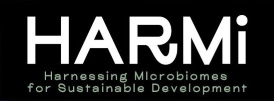Le Symposium HARMI se tiendra les 22 et 23 septembre 2025 au Manège de Brack à Dole.
Lundi 22 septembre 2025
10h00 : Accueil café
10h30 : Introduction, HARMI et ses financements
11h15 : Keynote par Monika Coton (Université de Bretagne Occidentale, Brest)
Can we reduce food waste due to moldy foods in consumer households while ensuring food safety?
12h00 : Pause déjeuner
13h00 : Session posters (voir liste)
14h00 : Keynote par Grégory Resch (CHU vaudois, Lausanne)
Phage Therapy: from bench to bedside.
14h40 : Session 1
Chair : Hervé Alexandre
14h40 : Yaël Grosjean, Centre des Sciences du Goût et de l’Alimentation
The taste of bacteria: How and what are the consequences?
15h00 : Chloé Abry, Procédés Alimentaires et Microbiologiques
Amphidinols extracted from Amphidinium carterae, a Novel Approach to controlling Brettanomyces bruxellensis during winemaking process.
15h20 : Eric Neyraud, Centre des Sciences du Goût et de l’Alimentation
Consommation d'aliments fermentés et microbiote oral. Quels impacts sur la perception sensorielle ?
15h40 : Pause café
16h00 : Session 2
Chairs : Didier Hocquet et Marie-Agnès Bringer
16h00 : Catherine Llanes, Chrono-environnement
Rôle des systèmes antiphages dans la diffusion du clone épidémique Pseudomonas aeruginosa ST235.
16h20 : Pierre Lapaquette, Procédés Alimentaires et Microbiologiques
The pore-forming toxin Candidalysin dampens the autophagy-related plasma membrane stress response during Candida albicans invasion of epithelial cells.
16h40 : Thibault Bourdin, Chrono-environnement
Réutilisation des eaux usées en agriculture : effets des résidus d'antibiotiques sur le microbiote intestinal et la résistance aux antibiotiques.
17h00 : Louise Basmaciyan, Procédés Alimentaires et Microbiologiques
Impact of agricultural chemical inputs on the intestinal microbiota at both microbial and fungal level.
17h20 : Apéritif autour des posters avec la compagnie de Salim Nalajoie
Mardi 23 septembre 2025
08h30 : Accueil café
09h00 : Keynote par Jan Roelof van der Meer (Université de Lausanne)
New concepts in soil microbiome functioning.
09h40 : Session 3
Chairs : Didier Hocquet et Laurent Beney
09h40 : Truc Phung, Procédés Alimentaires et Microbiologiques
Unlocking Probiotic Potential: Physicochemical Approaches to Evaluate Probiotic Bacterial Adhesion Potential to the Intestinal Tract.
10h00 : Bastien Polizzi, Laboratoire de Mathématiques de Besançon
Des équations pour comprendre la biogéographie du microbiote.
10h20 : Simon Manceau, Procédés Alimentaires et Microbiologiques
Vesicle-associated proteins enhance biofilm formation in Lacticaseibacillus casei BL23.
10h40 : Annie Frelet-Barrand, Franche-Comté Electronique Mécanique Thermique et Optique
Lactococcus lactis as a promising factory to functionally express & characterize proteins.
11h00 : Pause café
11h20: Session industriels
Introduction par Pascal Bertrand, Vitagora
GreenCell / Assia Dreux-Zigha
Lesaffre / Juliette Caron
Pollet / Jessica Gachet
Suez / Sophie Courtois
ARDPI-BIOTECH / Frédéric Badon, Frédéric Mercenne
Nexidia / Nicolas Desroche
12h20 : Pause déjeuner
13h15 : Session posters (voir liste) et industriels
14h15 : Résultats du concours photo HARMI
14h30 : Session 4
Chair : Fabrice Martin-Laurent
14h30 : Barbara Pivato, Agroécologie
Functional Trait Assembly in Root Microbial Communities: Contributions of Plant and Soil Filters.
14h50 : Victor Angot, Agroécologie
Eco-evolutionary dynamics of Pisum-Bacteria interactions mediated by reciprocal selection.
15h10: Yoann Boisson, Chrono-environnement
Fungal consortia inoculation enhance growth and remediation potential of poplar cuttings in contaminated soils.
15h30 : Samuel Jacquiod, Agroécologie
Conditionnement évolutif du microbiote rhizosphérique pour améliorer la résilience des plantes au stress hydrique.
15h50 : Pause café
16h05 : Session 5
Chair : Emmanuelle Vennin
16h05 : Aymé Spor, Agroécologie
Bioremédiation de sols et sédiments contaminés par l'isoproturon et la sulfaméthazine : une approche alternative pour construire des consortiums microbiens multidégradants.
16h25 : Clément Grandhay, Chrono-environnement
Etude de la biodiversité des levures dans les eaux karstiques : évaluation d'un protocole d'identification et analyse génomique.
16h45 : Suzie Lebee, Biogéosciences
Calcium Carbonate Precipitation Properties on Microbial Exopolymeric Substances (EPS) in a River System: Example of the Dard (Baume-les-Messieurs, Jura, France).
17h05 : Conclusion du symposium par Laurent Philippot


